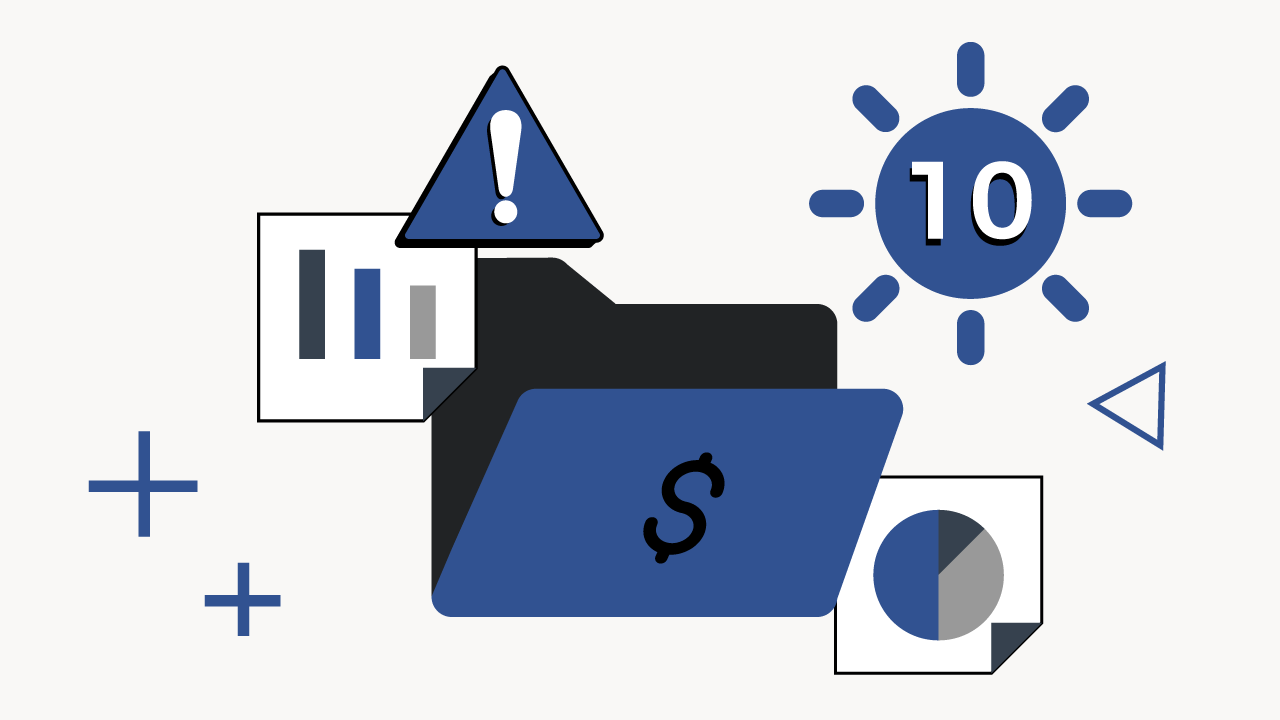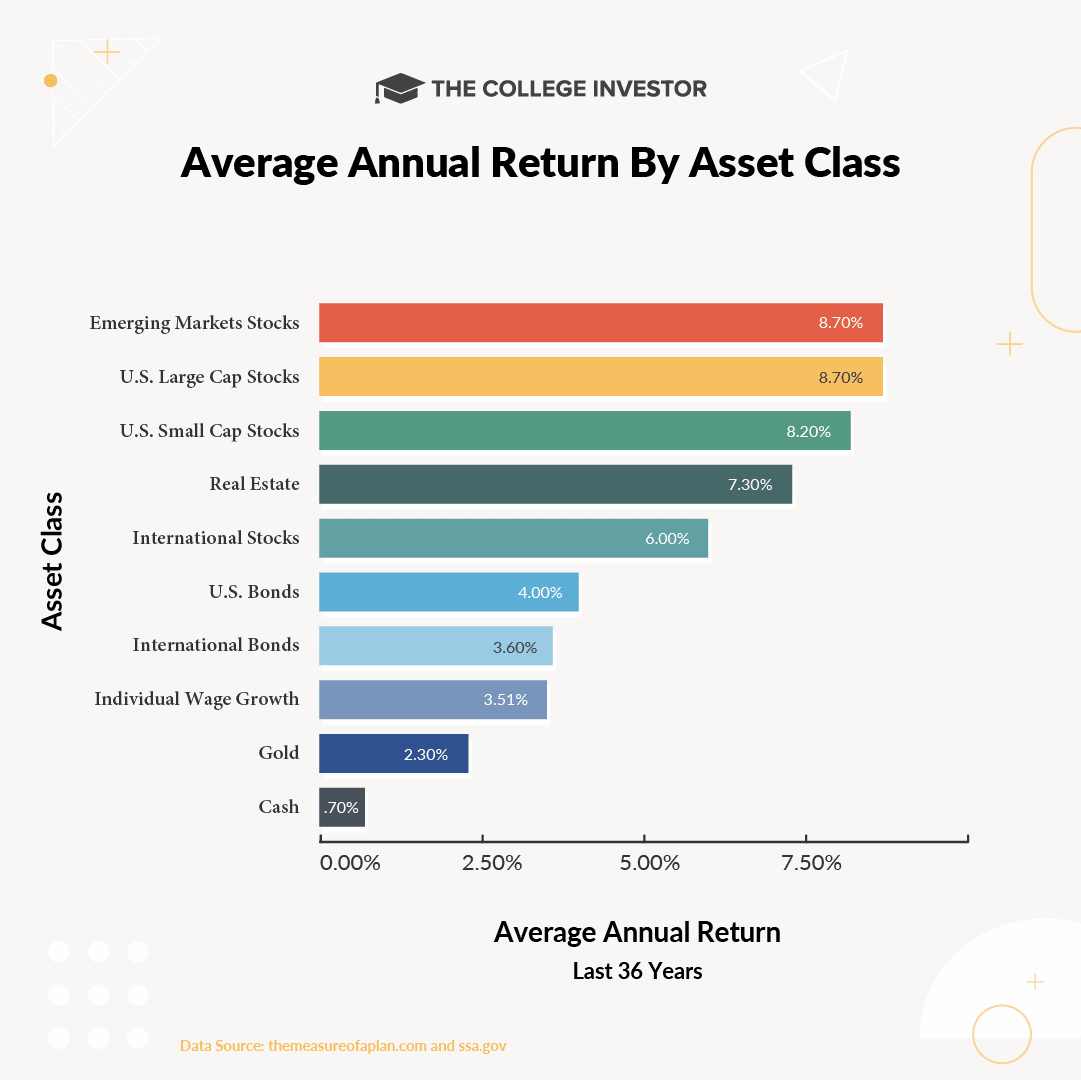
Threats to your investment portfolio can come from anywhere, including politics, the economy, and even your own mind. Understanding the threats to your investments is the first step to combating them.
Birch Gold, a company that helps investors buy and sell gold, polled its investors about their thoughts on the greatest threats to their well-being.
We combined some of the Birch Gold responses with other sources to deliver these top 10 threats to your investment portfolio.
1. Your Own Behavior
In the modern era, the biggest threat to your portfolio is your behavior. With a 24/7 News Cycle, it’s easy to think that it’s never a good time to invest. The over-cautious may hoard cash, which is guaranteed to lose value to inflation over time. More reckless investors may buy into meme stocks, over-invest in cryptocurrencies, or speculate on NFTs at the height of their prices only to see their investment prices drop like a rock.
Even if you don’t suffer from too much or too little caution, you may make some classic investment errors. For example, you may end up buying when hype and prices are at a peak and selling when public sentiment and prices are at their lowest.
Most people can’t approach their investment portfolio with complete stoicism, so the best alternative is to set up guidelines to keep your behavior in check. If you’re prone to reckless investing, take a small portion of your investment portfolio and designate it for big bets. Invest the rest of your portfolio for the long run.
Investing set amounts at regular intervals, called dollar-cost averaging, can keep you from buying at all-time highs. It also ensures that you aren’t merely saving but also investing. A well-diversified portfolio can also keep your behavior in check. If your portfolio includes a variety of asset types, your portfolio is less likely to experience wild swings in value. This can keep you from panic selling when prices drop.
2. Inflation
Inflation is colloquially defined as too much money chasing too few goods. For decades, the United States enjoyed low inflation, but in 2022 inflation rocked consumers while the stock market struggled. That year was a sobering look at how much damage inflation can do to an investment portfolio.
Here's what inflation has ranged over the last few years according to the Federal Reserve:
Year | Annual Inflation Rate |
|---|---|
2023 | 4.1% |
2022 | 8.0% |
2021 | 4.7% |
2020 | 1.2% |
Over the long run, your investment portfolio needs to produce returns higher than the rate of inflation, or you’ll lose buying power over time. High rates of inflation can quickly erode the value of your investment portfolio. Since 1960, the average inflation rate in the United States has been 3.8% per year.
To constrain the impact of inflation, your investment portfolio needs to include asset classes that typically outperform inflation (like stocks) and assets that act as a hedge against inflation (like real estate and precious metals).

3. Economic Downturns
An economic downturn can be a double threat to your investment portfolio. During a downturn, you’re more likely to lose your income, so you may need to dip into your investment portfolio to fund your living expenses. Additionally, the stock market is often a “leading indicator” of a bad economy. The value of your investments may tumble right before you need to withdraw money from your portfolio.
Most investors know that the economy goes through cycles that include boom periods and recessions, but economic downturns are never predictable in length or severity. Selling assets in an economic downturn means you may sell at low prices instead of high prices. To counteract this risk, many investors try to invest in some defensive stocks or other “counter-cyclical” assets where prices tend to rise when the economy heads into a tailspin.
4. Stock Market Volatility
Stock prices seem to rise and fall for no reason. Sometimes good news for a company results in stock prices rising. Other times, the good news leads to a price drop. This head-scratching volatility poses a major threat to investors, especially those who buy and sell individual stocks.
While stock market volatility is tough to handle when you’re saving and investing, it’s even more devastating if you need to withdraw money from your portfolio. Retirees who rely on their portfolio to cover expenses may have to sell assets to cover their living expenses even when stock prices fall.
If you have money you know you'll need within the next five years consider investing it in more stable investments, rather than the stock market. That way you won't be forced to sell when prices are down.
5. Politically Motivated Spending Bills
Whether you worry more about Trumponomics or Bidenomics, politically motivated spending bills may be a threat to your investment portfolio. When the Federal government spends in a deficit, the national debt increases. This means more taxpayer dollars go to servicing government debt.
Although the United States has not experienced a debt emergency since the Civil War, other nations have had debt emergencies in the modern era. These countries with modern economies experienced economic volatility, economic stagnation, and other woes because their national debt load got out of hand. Under the wrong circumstances, the United States economy may experience similar issues.
6. High Pressure “Investment” Sales Situations
Many investors save and invest diligently for years which leads to a decent nest egg. But when these investors go looking for financial advice, they could end up in high-pressure sales situations.
Financial “Advisors” may talk you into fee-loaded whole life insurance policies or costly annuities. If you buy a fee-loaded product that isn’t right for you, you may end up spending thousands of dollars unwinding the decision. If you stick with the product, you may own underperforming assets for years before you can stop paying for the product.
Always be sure that you fully understand any investment before you move forward. If you are feeling pressured by a fast talking advisor, tell them you need to think about it and get a second opinion.
7. Job Loss
Roughly 6 million people lose or leave their jobs every single month in the United States. While many of those job separations are related to leaving a job for a better job, others are layoffs or terminations.
If you’ve lost a job, you could spend weeks or months looking for your next full-time role. During this time, you may need to tap into your investment portfolio to fund your living expenses. If you’ve got a seven-figure investment portfolio, pulling a few thousand dollars from the portfolio won’t do you any long-term harm. On the other hand, if you need to liquidate a large percentage of your portfolio, it may take years for your portfolio to recover.
Many people can mitigate the risk of job loss by developing multiple streams of income, saving an emergency fund, and cutting to a simple budget when their income is low.
8. Lack of An Emergency Fund
An emergency fund is your investment portfolio’s first line of defense. Sure, it can help you through a job loss, but can also cover a huge range of expenses. A big stash of cash can come in handy when you need to cover an unexpected medical bill, pay for a new windshield, or cover the water bill when you don’t have a steady income.
If you have cash, you can pay for unexpected expenses without having to sell assets or take on debt.
9. Rising Healthcare Costs
General inflation is a relatively new concern for many investors, but rising healthcare costs have been a concern for years. According to Fidelity’s Retiree Health Care Cost Estimate, a 65-year-old who retired in 2023 can expect to pay $157,500 in healthcare costs during their retirement. This represents significant spending for a person relying primarily on their investment portfolio and Social Security.
While most people will prioritize health-related spending over growing an investment portfolio, it is important to plan for healthcare costs that could rise faster than the general rate of inflation.
10. Insufficient Diversification
Famed investor, Harry Markowitz said, “Diversification is the only free lunch in investing.” He said this because well-diversified portfolios experience less volatility than stocks-only portfolios, and a well-diversified portfolio may perform better than one with only stocks.
Investing in a variety of asset classes including stocks, bonds, real estate, precious metals, and alternatives can keep your portfolio growing even when one or two asset classes are declining.
Final Thoughts
Although each one of these threats can damage your investment portfolio, you can defend your wealth. Developing economic resilience with an emergency fund, multiple streams of income, and the ability to cut your spending goes a long-way towards keeping your investment portfolio in place.
From an investment standpoint, controlling your behavior, maintaining proper diversification, and using tested investment strategies can help you during economic boom times and during busts.

Hannah is a wife, mom, and described personal finance geek. She excels with spreadsheets (and puns)! She regularly explores in-depth financial topics and enjoys looking at the latest tools and trends with money.
Editor: Ashley Barnett Reviewed by: Robert Farrington